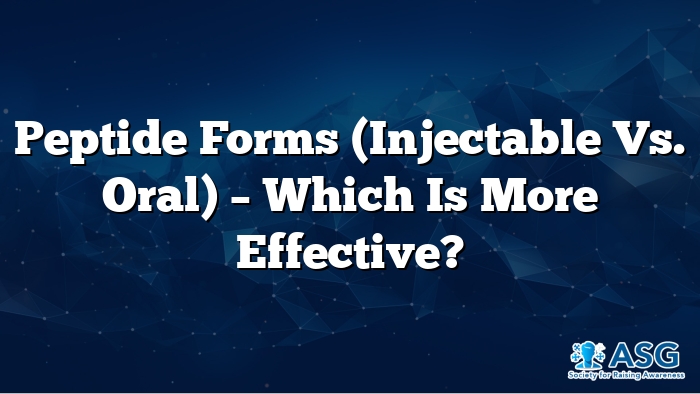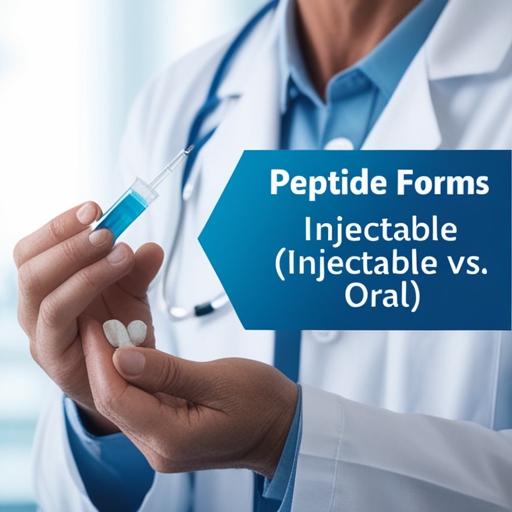Peptide Forms (Injectable vs. Oral) – Which Is More Effective?

Peptides are fascinating molecules that play crucial roles in various biological processes. These short chains of amino acids have gained significant attention in fields like medicine, cosmetics, and fitness due to their diverse applications and potential benefits. Understanding the different forms of peptides, particularly injectable and oral, is essential for making informed decisions about their use.
What Are Peptides?
Peptides are short sequences of amino acids linked by peptide bonds. While smaller than proteins, they perform similar functions and are involved in numerous biological processes, including hormone regulation and immune response. Bioactive peptides have specific functions in the body, acting as hormones, enzymes, or signaling molecules.
The human body naturally synthesizes peptides, but they can also be produced synthetically. This versatility has led to their widespread use in various industries, from pharmaceuticals to cosmetics.
Injectable Peptides: Mechanism and Benefits
Injectable peptides are administered directly into the bloodstream, ensuring rapid absorption and immediate effects. This method is often preferred in medical treatments and fitness regimes due to its high efficacy.
The process of using injectable peptides typically involves:
1. Reconstitution of peptide powders
2. Mixing with a sterile solution
3. Injection using a sterile syringe
Peptide reconstitution is a critical step that requires precision and sterile conditions. Proper reconstitution ensures the peptide's stability and effectiveness while minimizing the risk of contamination.
Benefits of injectable peptides include:
– Rapid and effective results
– Higher bioavailability
– Precise dosing
– Ideal for targeted treatments
Oral Peptides: Mechanism and Advantages
Oral peptides are taken by mouth and absorbed through the digestive system. While their absorption process is slower compared to injectable peptides, they offer unique advantages:
– Convenience and ease of use
– Non-invasive administration
– Improved patient compliance
– Longer peptide shelf life
Oral peptides are often encapsulated to protect them from stomach acids, ensuring they reach the intestines intact. This encapsulation process enhances their bioavailability, although it typically remains lower than that of injectable peptides.
Bioavailability Comparison
Bioavailability refers to

the amount of a substance that reaches the bloodstream and becomes available for biological effects. Injectable peptides have significantly higher bioavailability as they bypass the digestive system. In contrast, oral peptides have lower bioavailability due to partial breakdown by stomach acids and enzymes in the digestive tract.
| Peptide Form | Bioavailability | Absorption Rate |
|---|---|---|
| Injectable | High | Rapid |
| Oral | Lower | Slower |
Side Effects and Risks
Both injectable and oral peptides can have potential side effects and risks:
Injectable peptides:
– Pain at the injection site
– Allergic reactions
– Risk of infection if not administered properly
Oral peptides:
– Gastrointestinal issues (nausea, stomach cramps)
– Reduced effectiveness due to digestive breakdown
It's crucial to consult a healthcare provider before starting any peptide therapy and to purchase peptides from reputable peptide suppliers to ensure quality and safety.
Cost Comparison
Injectable peptides are generally more expensive due to their higher bioavailability and effectiveness. They also require additional equipment like syringes and sterile solutions. Oral peptides, while more affordable, may require higher doses to achieve similar effects due to their lower bioavailability.
Effectiveness of Delivery Methods
Injectable peptides are typically more effective, providing rapid and consistent results. This makes them ideal for medical treatments and situations where precise dosing is crucial. Oral peptides, while less effective due to lower bioavailability, offer convenience and ease of use, making them suitable for long-term treatments and general wellness applications.
Patient Compliance and Convenience
Patient compliance is a crucial factor in the effectiveness of any treatment. Injectable peptides require regular injections, which can be inconvenient for some patients. Proper peptide customer service and clear instructions can improve compliance.
Oral peptides, on the other hand, offer greater convenience. They're easy to take, store, and transport, making them ideal for long-term use and patients who prefer non-invasive treatments.
Clinical Studies and Efficacy
Numerous clinical studies have demonstrated the efficacy of peptides in various applications. Injectable peptides have shown particularly promising results in medical treatments due to their high bioavailability and rapid effects.
Oral peptides, while less studied, have also shown efficacy in certain applications. Ongoing research aims to improve their bioavailability and effectiveness through advanced encapsulation techniques and delivery methods.
Peptide Quality and Safety
Ensuring the quality and safety of peptides is paramount. Reputable peptide manufacturers adhere to strict quality control measures, including:
– Peptide purity tests
– Peptide batch testing
– Peptide authentication
When purchasing peptides, look for peptide certificates and evidence of rigorous quality control processes. Peptide safety should always be a top priority, regardless of the form or application.
Storage and Handling
Proper peptide storage is crucial for maintaining their efficacy and safety. Injectable peptides often require refrigeration and careful handling to prevent contamination. Peptide vials should be stored according to manufacturer instructions.
Oral peptides typically have less stringent storage requirements, but they should still be kept in a cool, dry place away from direct sunlight. Always check the peptide shelf life and follow proper storage guidelines.
The Peptide Market and Industry Trends
The peptide market is rapidly growing, with new applications and products emerging regularly. Peptide marketplaces and online peptide stores have made these products more accessible to researchers and consumers alike.
Key trends in the peptide industry include:
– Increased focus on pharmaceutical peptides
– Advancements in peptide synthesis techniques
– Growing demand for cosmetic and anti-aging peptides
– Expansion of peptide clinics offering specialized treatments
Legal and Regulatory Considerations
The legal status of peptides varies depending on their specific application and jurisdiction. Some peptides are classified as research chemicals, while others are approved for medical use. Always check peptide legality in your area and consult with appropriate authorities before purchasing or using peptides.
Future of Peptide Therapies
The future of peptide therapies looks promising, with ongoing research and development in areas such as:
– Improved delivery methods for oral peptides
– Novel applications in regenerative medicine
– Personalized peptide therapies
– Integration with other emerging technologies like nanotechnology
As the field advances, we can expect to see more targeted and effective peptide treatments across various industries.
Conclusion
Peptides offer a wide range of potential benefits in fields ranging from medicine to cosmetics. Understanding the differences between injectable and oral peptides is crucial for making informed decisions about their use. While injectable peptides offer higher bioavailability and rapid effects, oral peptides provide convenience and ease of use. Regardless of the form, always prioritize quality, safety, and proper guidance from healthcare professionals when considering peptide therapies.
Frequently Asked Questions
How do I choose between injectable and oral peptides?
Consider your specific needs, the peptide's bioavailability, and your comfort level with different administration methods. Consult a healthcare provider for personalized advice.
Are peptides safe for long-term use?
Safety depends on the specific peptide and individual factors. Always follow recommended dosages and consult with a healthcare professional for long-term use.
How can I verify the quality of peptides I purchase?
Look for reputable suppliers, check for peptide certificates and purity tests, and consider third-party lab analysis for additional assurance.
